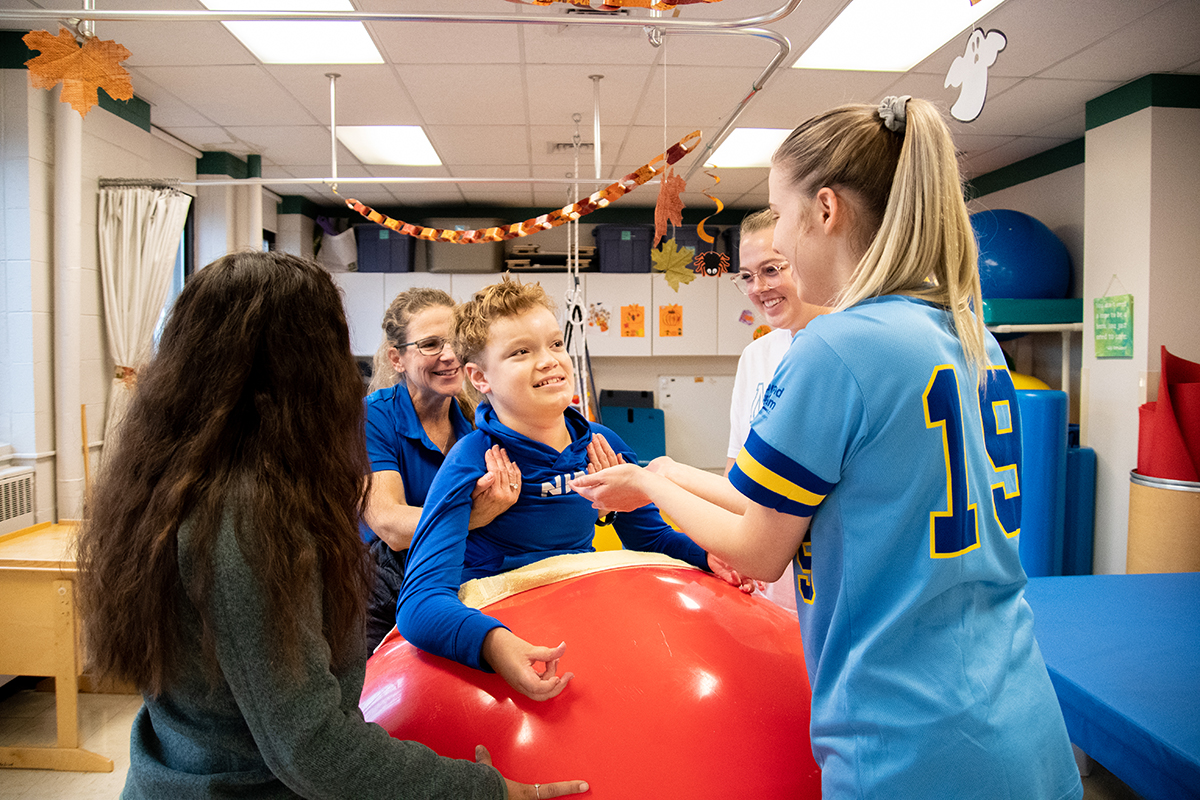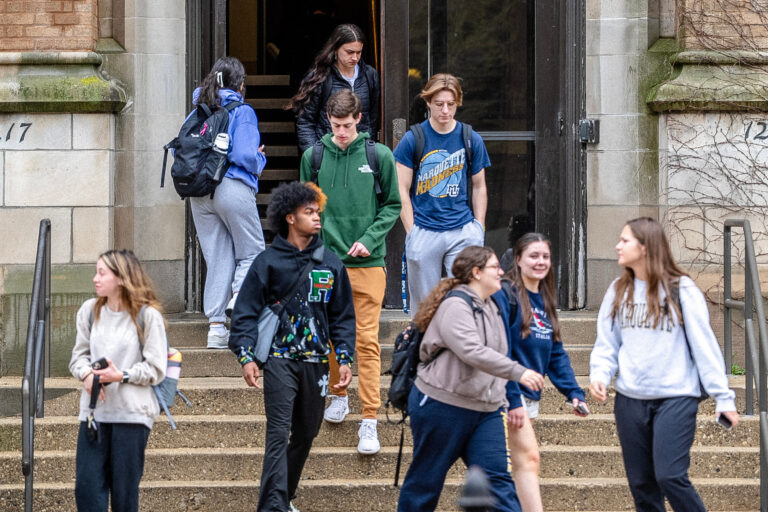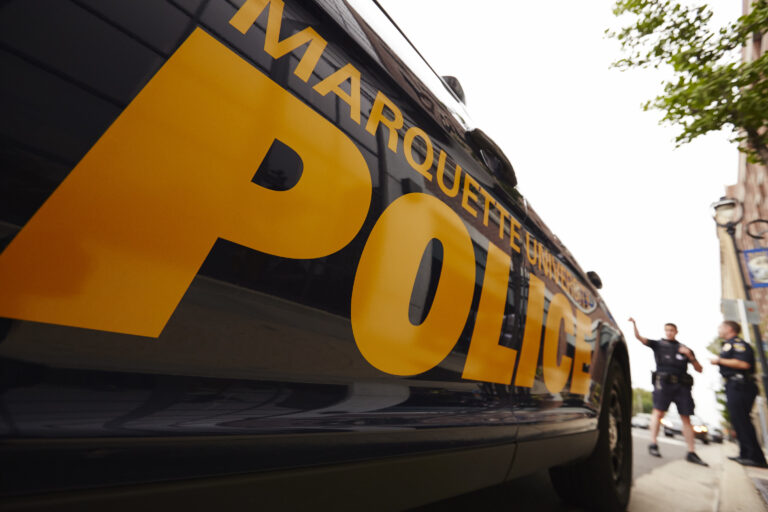The College of Health Sciences’ many pediatric programs serve young patients in the region with truly advanced therapies — delivered with care and imagination.
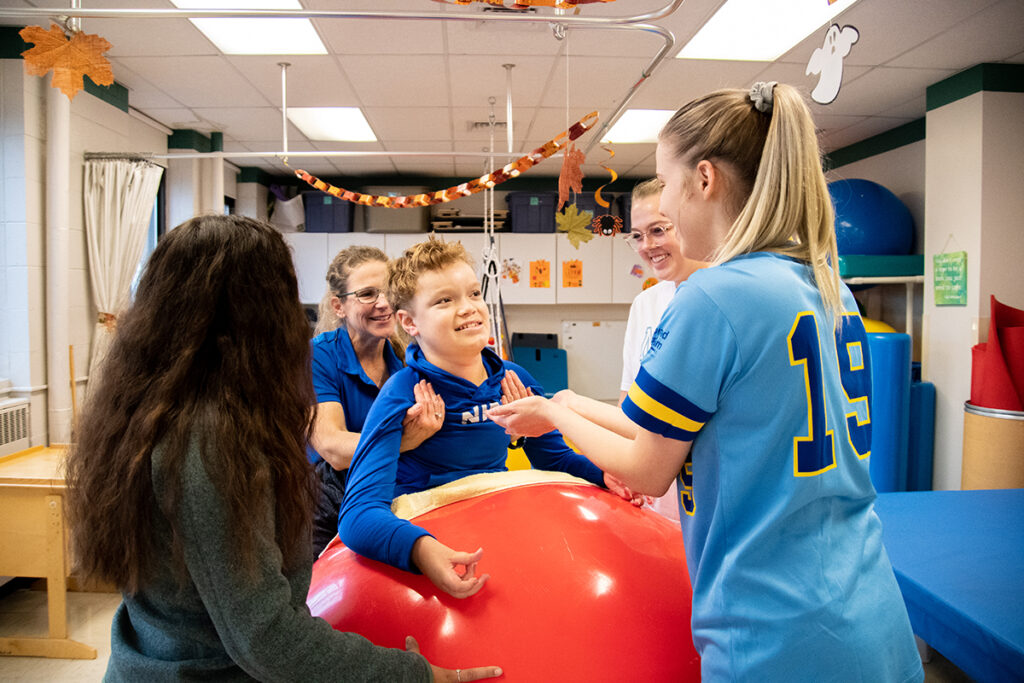
By Haley Wasserman, H Sci ’20, photos By Alex Nemec
“Lemonade, fresh lemonade!”
A young boy stands on the sidewalk near Wisconsin Avenue waving his arms at pedestrians. Behind him, a colorful lemonade stand is tucked under the overhang of the Olin Engineering Center. Other children, some with hearing devices, cluster around the stand, talking and smiling. The boy has only recently found his voice and enthusiasm, thanks to the therapeutic assistance of faculty and students from the Speech Pathology and Audiology Department of the College of Health Sciences.
This is Camp HILS — for Hearing Intensive Language and Speech — a clinical summer camp that is part of the Marquette University Speech and Hearing Clinic (MUSHC). Through the camp, faculty in speech pathology and audiology and their students help children who are deaf or hard of hearing learn about speech and language awareness, about caring for and using their hearing devices, and about advocating for their communication needs in social settings.
Over the camp’s three-week sessions, clinical faculty supervise students who provide individualized and group therapy — some of which is disguised as play, such as participating in scavenger hunts, engaging in field trips or running a lemonade stand. Children are able to learn and practice communication skills they’ll need in the real world, including language revolving around sharing or collaborating on tasks.
“Our work is fun, and I think the kids would agree,” says Bridget Valla, CJPA ’91, Grad ’92, clinical associate professor of speech pathology. A licensed speech-language pathologist, she helps operate a handful of pediatric clinical programs within the department, including Camp HILS.
All told, College of Health Sciences faculty and students run 10 pediatric clinical programs in specialties ranging from speech and audiology to physical therapy and occupational therapy. Children served in this array of clinical settings range from those with autism spectrum disorder to those with muscular dystrophy or those recovering from brain and spinal cord injuries.
Each clinical program provides exceptional care to children and their families, coupling cutting-edge clinical techniques with compassion to serve clients in the Milwaukee community. Simultaneously, the clinical programs use hands-on involvement to train the next generation of health professionals. “These clinics harness faculty expertise and state-of-the-art care that families in the area would otherwise be unable to access. They serve as magnets within the region for specials needs therapies,” says Dr. William E. Cullinan, dean of the College of Health Sciences.
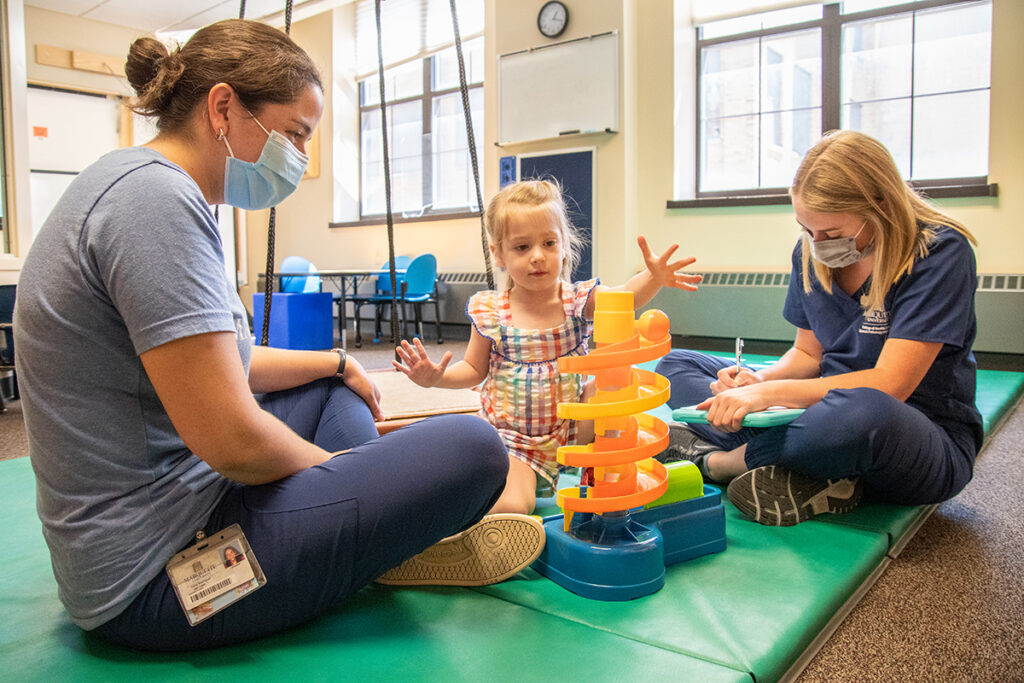
Creativity and Collaboration
In the speech and audiology department, Camp HILS is one of several programs that collectively offer an array of speech therapy services through the Speech and Hearing Clinic. Overseen by Wendy Krueger, Grad ’92, clinical associate professor and director of clinical education in the department, the clinic and its programs offer highly respected services for adults and children — but more than half of the caseload is pediatric. And when clients cannot afford care, they’re treated on a “pay-what-you-can” basis.
The clinic serves a majority of these clients in tailored individual sessions, while also offering an impressive array of specialized groups and camps. The Adolescent Social Skills Group is one such program, imparting students and clients with valuable opportunities to engage with one another in creative clinical settings. A group of teenagers with developmental disabilities meets with faculty and students to learn and practice speech for social situations in theme-based immersive experiences. In one instance, the group spent time learning about language usage for movie theaters, then ventured to the Weasler Auditorium to practice purchasing movie tickets and concessions. “It’s difficult to do these kinds of activities in a clinic that is not on a university campus, but here we have the opportunity to treat outside of the box,” Valla says.
All speech-language services are provided by student clinicians under the direct supervision of Valla and Katherine Czelatdko, clinical assistant professor of speech pathology and audiology, and other clinical faculty who are all licensed, certified speech-language pathologists with specialization in a wide range of communication disorders. For the students, these experiences in campus clinics hone collaboration skills that are essential in pediatric treatment. So, a focus of her clinical instruction in the Speech and Hearing Clinic, Czelatdko says, is emphasizing the importance of joining forces with caregivers and community and school personnel when treating children of all ages, coming together as a team to help children apply their skills generally across home, school and clinic environments.
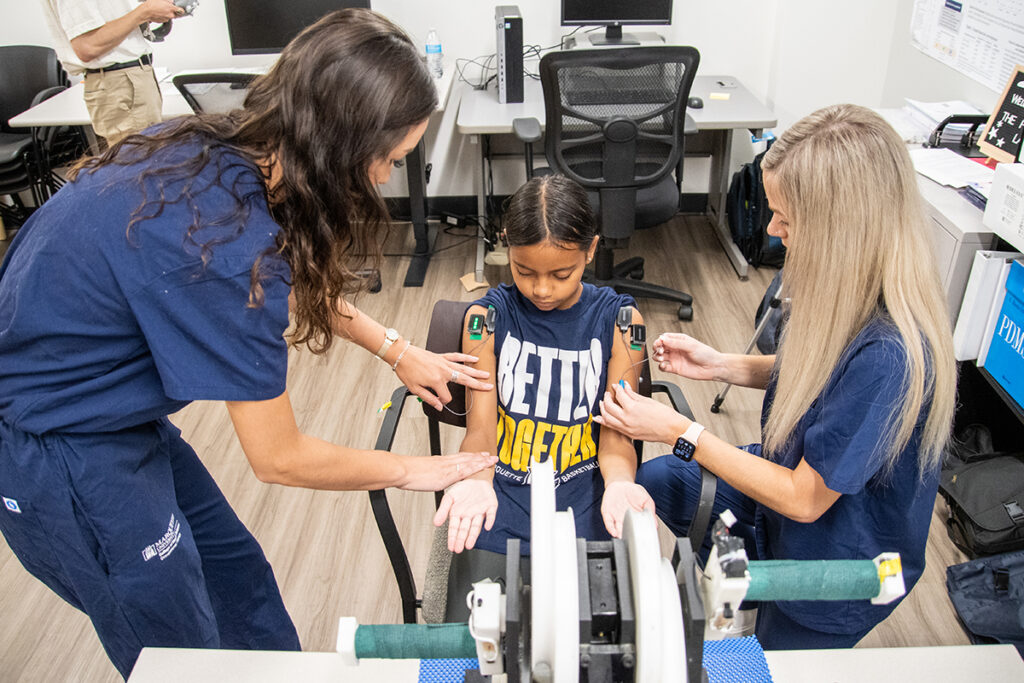
Learning to Live Young Lives
Occupational therapy focuses on teaching or rehabilitating individuals so they can carry out necessary and desired daily tasks, also known as occupations. In serving young clients, Dr. Ann Millard, associate chair and clinical assistant professor of occupational therapy, incorporates creativity and play into the work she does as a pediatric occupational therapist in the interdisciplinary Neuro Recovery Clinic.
In this pediatric setting, the activities vary for clients, including those who have a genetic or developmental disorder or those learning to live with a disability that affects mobility, such as cerebral palsy. This therapy is often long term for the children, evolving as they meet their treatment goals and plan for daily life as they get older.
“Play is both a means and an end in therapy,” says Millard. “This is a holistic profession where we help children with the job of living, working to give them confidence and independence to live their lives.” Millard works with children in one of the college’s newest clinical offerings since the Occupational Therapy program was founded in 2019 and welcomed its first students in 2020. In a colorful gym in the Occupational Therapy program’s building on West Wells Street, Jenga blocks help children fine-tune motor development, and slides and swings aid in focus on sensory processing skills. Students assist during designated clinic trainings built into their curriculum.
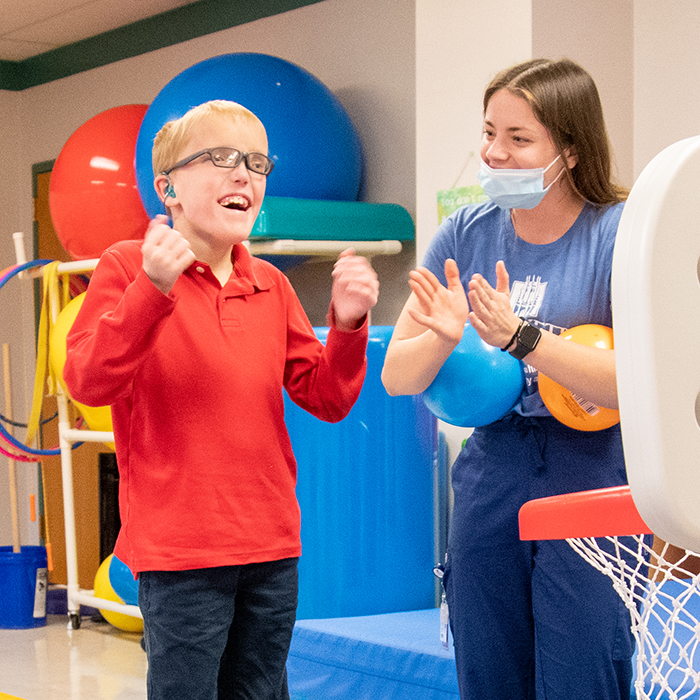
Making strides
Also opened in 2019, thanks to donor support, the interdisciplinary Neuro Recovery Clinic with its main location in Cramer Hall offers multiple clinical programs to treat patients of all ages with neurologic disorders, including spinal cord or brain injury, stroke, Parkinson’s and other complex conditions.
Dr. Anne Pleva, PT ’93, clinical assistant professor of physical therapy, oversees the pediatric physical therapy clinic within the Neuro Recovery Clinic. She is the sole faculty provider handling the pediatric cases in the clinic. Like the other clinical programs, Pleva works to create joyful, play-based therapy sessions for her clients, while also working to train students.
Her outpatient clinic is bursting with color and light, with adaptive and therapy equipment, plus many toys and games. The space is used for treatment and teaching. Physical therapy students serve as volunteer assistants, and those interested in pediatric specialization can be paired with a client for an entire semester as part of an advanced pediatric elective class. In each session, Pleva and her students develop children to their fullest potential using creative play strategies to strengthen muscles, improve balance and develop new patterns of movement.
“The College of Health Sciences offers me, the students and the families this unique setting, with state-of-the-art equipment, energetic student helpers and clinical expertise all focused on helping their child make progress, while educating the next generation of pediatric therapists,” Pleva says. “Many of the children we work with have complex, multi-system disabilities. Along with their families, we celebrate every inchstone of progress together.”
Across the Health Sciences clinical programs, collaboration between care providers is crucial to maximize benefits to individual clients and to advance research. In complex cases, clinical faculty team up for treatment, occasionally providing physical and speech therapy simultaneously, or referring clients to other programs based on their needs.
“Our clinical programs are built on the foundation of collaborative care,” adds Krueger. “It is important that we instill in our students the importance of interprofessional clinical practice to carry into their future careers. Families receiving services in all of Marquette’s clinics are being treated by leading clinicians in their respective fields. Our clinical faculty have such a strong reputation in the community for their expertise and decades of experience.”
